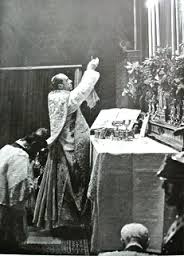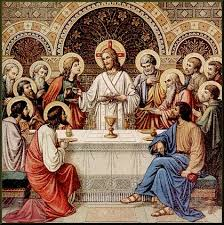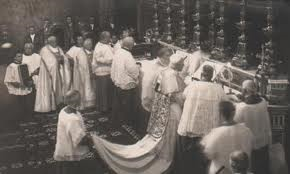First, by remembering at the beginning of the Mass, that we ourselves should be the offering of reconciliation to God’s justice, but that Jesus, the Son of God, out of infinite love, gave Himself to us as an offering by which we become reconciled with His Father, perfectly glorify and thank Him; and though the priest stands alone at the altar, alone speaking, and with his hands offers the sacrifice, we must unite ourselves with him and offer the sacrifice with him. The first manner of hearing Mass is to perform the sacrifice with the priest, doing as far as we can, in spirit, that which he does, remembering that we have met not only to hear Mass, but at the same time to perform and offer the sacrifice with the priest.
Pope Pius XII Offers the TLM To do this, we should humble ourselves with the priest at the foot of the altar, as poor sinners before God, imploring mercy; at the Gloria praise God with the priest, at the Epistle and Gospel thank God for His sacred word, resolving to live in accord and with it; at the Credo make a profession of faith with heart and lips, earnestly promising to live and die in the Holy Catholic Church; at the Offertory offer our heart with all its desires and inclinations, a profession of faith with hear and lips, earnestly promising sacrifice to God; at the Sanctus to praise God with all the angels and saints. Before the Elevation we should be sincerely sorry for our sins, consider that we are unworthy to appear in the sight of God, remember that we must make satisfaction for our sins, and, during the Memento for the living, make a memento with the priest.
To do this, we should humble ourselves with the priest at the foot of the altar, as poor sinners before God, imploring mercy; at the Gloria praise God with the priest, at the Epistle and Gospel thank God for His sacred word, resolving to live in accord and with it; at the Credo make a profession of faith with heart and lips, earnestly promising to live and die in the Holy Catholic Church; at the Offertory offer our heart with all its desires and inclinations, a profession of faith with hear and lips, earnestly promising sacrifice to God; at the Sanctus to praise God with all the angels and saints. Before the Elevation we should be sincerely sorry for our sins, consider that we are unworthy to appear in the sight of God, remember that we must make satisfaction for our sins, and, during the Memento for the living, make a memento with the priest.
We can here follow St. Francis Borgia, who vividly represented to himself, during the holy Sacrifice, the Bloody Sacrifice of Jesus on the Cross and meditated in his memento upon the five wounds of Jesus. At the thought of the wound of the right hand, he recommended to God the Pope, bishops and priests; at the wound of the left hand, officers of justice, and heads of civil power; at the wound of the right foot, all spiritual orders; at he left, all relations, friends, benefactors, and all who had commended themselves to his prayers. The wound in the side he reserved for himself; into this he entered and hid himself with all his wishes and anxieties. He made the memento for the dead in the same way, commending his departed friends, benefactors and all for whom he intended to pray, and all forsaken souls, through the wounds of Jesus, offering them with Him to God.
At the Elevation, we should with the priest, in deepest reverence, adore Jesus, offering Him, the true Lamb of Sacrifice, to God the Father, for His Glory, in thanksgiving for graces received, in satisfaction for our sins and for the sins of the whole world; for help in our needs and our weakness, and in supplication for new graces, offering ourselves also entirely for the same objects.
After the Elevation, we should adore the Saviour present on the altar, thank Him for His gracious condescension, exciting in ourselves the ardent desire of a sincere union with Him and through Him with His Heavenly Father.
The Second Form of Devotion at Mass, belonging to the third principal part, reaching from the Pater Noster to the end, which includes the priest’s reception of the Holy Communion. For the Church desires that the faithful should unite themselves at every Mass with Jesus by Communion, and through Him with His Heavenly Father, becoming one with Him, which is the great end of the Sacrifice of Jesus. But as actual Communion at every Mass is not possible, we should receive Communion spiritually, that is, excite in ourselves the fervent desire to be spiritually united with Christ; spiritually because we can then receive only the spiritual gifts and graces given to those who receive Him sacramentally.  If we desire to make a spiritual Communion with the priest at Mass, then we should, after the Pater Noster, sincerely repent of our sins, awaken in ourselves a vivid faith in Christ’s presence, a firm confidence in His merits, and a fervent love for Him, and then at the priest’s Communion excite within us an ardent desire to receive Christ and be united to Him. When this is done, we should thank God for the graces we have received and recall to our minds, during the day, the goodness and love of this divine Saviour, whose pleasure it is to be with the children of men, to enrich them with His blessings.
If we desire to make a spiritual Communion with the priest at Mass, then we should, after the Pater Noster, sincerely repent of our sins, awaken in ourselves a vivid faith in Christ’s presence, a firm confidence in His merits, and a fervent love for Him, and then at the priest’s Communion excite within us an ardent desire to receive Christ and be united to Him. When this is done, we should thank God for the graces we have received and recall to our minds, during the day, the goodness and love of this divine Saviour, whose pleasure it is to be with the children of men, to enrich them with His blessings.
The third form of Devotion consists in placing before our minds that this Holy Sacrifice is a commemoration of Christ’s sufferings and of that great love which He has shown us. Christ foresaw that, if we assisted at this sacrifice, it would be a continual recollection of what He had suffered for us, a powerful incentive to the soul to love Him and serve Him, and for the vivid conception of this, the ceremonies of the Mass, we are reminded of the whole passion of Christ, and are able to walk, so to speak, over the path of His sufferings, as seen by the following:
Meaning of the Ceremonies at Mass
1. The Priest Goes to the altar - Christ Goes to Mount Olivet.
2 The Priest Commences Mass - Christ Begins to pray.
3 The Priest Says Confiteor - Christ Falls down and sweats blood.
4 The Priest Goes up and kisses the altar - Christ Is betrayed by Judas with a kiss.
5 The Priest Goes to the Epistle side - Christ Is captured, bound, and taken to Annas
6 The Priest Reads the Introit - Christ Is falsely accused by Annas and blasphemed.
7 The Priest Goes to the middle of the altar and says the Kyrie eleison - Christ Is brought to Caiphas and there three times denied by Peter.
8 The Priest Says the Dominus vobiscum - Christ Looks at Peter and converts him.
9 The Priest Reads the Epistle - Christ Is brought to Pilate.
10 The Priest Says the Munda cor meum at the middle of the altar - Christ Is taken to Herod and mocked.
11 The Priest Reads the Gospel - Christ Is taken back to Pilate and again mocked.
12 The Priest Uncovers the chalice - Christ Is shamefully exposed.
13 The Priest Offers bread and wine - Christ Is cruelly scourged.
14 The PriestCovers the chalice - Christ Is crowned with thorns.
15 The Priest Washes his hands - Christ Is declared innocent by Pilate.
16 The Priest Says the Orate Fratres - Christ Is shown by Pilate to the people with the words, Ecce Homo.
17 The Priest Prays in a low voice - Christ Is mocked and spit upon.
18 The Priest Says the Preface and the Sanctus - Christ Is preferred instead of Barrabas and condemned to crucifixion.
19 The Priest Makes the Memento for the living - Christ Carries the cross to Mount Calvary.
20 The Priest Continues to pray the Canon in a low voice - Christ Meets His Mother and the other pious women.
21 The Priest Blesses the bread and wine with the sign of the cross - Christ Is nailed to the cross.
22 The Priest Elevates the Sacred Host - Christ Is raised on the cross.
23 The Priest Elevates the chalice - Christ Sheds blood from the five wounds.
24 The Priest Prays in a low voice - Christ Sees His afflicted Mother at the cross.
25 The Priest Says aloud, Nobis queque peccatoribus - Christ Prays on the cross for men.
26 The Priest Says aloud the Pater noster - Christ Says the seven last words on the cross.
27 The Priest Breaks and separates the Host - Christ Gives up His spirit and dies.
28 The Priest Lets a small portion of the sacred Host fall into the chalice - Christ His soul descends to Limbo.
29 The Priest Says the Agnus Dei - Christ Is acknowledged on the cross as the Son of God by many bystanders.
30 The Priest Administers Holy Communion - Christ Is laid in the tomb.
31 The Priest Cleanses the chalice - Christ Is anointed by pious women.
32 The Priest Prepares the chalice again - Christ Rises from the dead.
33 The Priest Says the Dominus vobiscum - Christ Appears to His Mother and the disciples.
34 The Priest Says the last prayers - Christ Teaches for forty days.
35 The Priest Says the last Dominus vobiscum - Christ Takes leave of His disciples and ascends to heaven.
36 The Priest Gives the benediction to the people - Christ Sends down the Holy Ghost
37 The Priest Says the Ita Missa est and the last Gospel - Christ Sends the apostles into all parts of the world to preach the Gospel.
In this manner we can bring Christ’s passion vividly before our eyes and unite ourselves with the sufferings of our divine Saviour, which is the leading intention of the Holy Mass. We should not fail at every representation to make short acts of love, repentance, humility, submission and thanksgiving.
Whoever assists at the holy Sacrifice of the Mass in the manner described and performs this devotion with deep reverence and attention, with recollection and fervent contrition, will surely not go away void of graces; for if God is always prepared to share His graces with us, then will He not most willingly give them there where His only-begotten Son is the true Lamb of Sacrifice, and make our petitions His own?
St. Pius X Offers the TLM At the same time it is seen from this, that those who wish the Mass to be said in their own language instead of Latin, complain unnecessarily, for everyone can unite himself with the priest and make his offering in his own tongue, since with God it does not depend upon the language, and there is in most prayer books an explanation of the ceremonies connected with suitable prayers. The Catholic Church has very wisely retained the Latin as the language of the Mass, as a means of preserving ecclesiastical unity, and Catholics can everywhere recognize themselves as such, when they find in every land the same divine service in the same language.
At the same time it is seen from this, that those who wish the Mass to be said in their own language instead of Latin, complain unnecessarily, for everyone can unite himself with the priest and make his offering in his own tongue, since with God it does not depend upon the language, and there is in most prayer books an explanation of the ceremonies connected with suitable prayers. The Catholic Church has very wisely retained the Latin as the language of the Mass, as a means of preserving ecclesiastical unity, and Catholics can everywhere recognize themselves as such, when they find in every land the same divine service in the same language.
The holy Sacrifice would, besides, be endangered by the introduction of the different languages of the countries in which it is said, because the vernacular is always subjected to changes, would give rise to false interpretations, diminish reverence for the Most Holy Sacrifice, and might endanger the faith itself, while the Latin language is peculiarly suited to the dignity and majesty of the Mass; for it is truly a royal language, and is the language of the missionaries who subjected the world to the cross.
The celebration of the Mass is not for the instruction of the people so much as for their edification, and this easily results if each of the faithful assists with heart and lips, as best he can, at the Holy Sacrifice, having the sincere desire to share in all its fruits, which our loving Saviour obtained for us on the cross and wishes to bestow upon us. We are enriched by His merits, purified by His most precious blood, nourished and strengthened in the way of virtue by His most Sacred Body, and are changed from children of wrath to children of God, and chosen heirs of heaven.
The Traditional Latin Mass: A Reenactment of Christ’s Last Days on Earth
By: Rev. Leonard Goffine
Latin must be retained because vernacular is always subjected to changes, would give rise to false interpretations, diminish reverence for the Most Holy Sacrifice, and might endanger the faith itself.
Editor’s Note: Knowing that many devout souls are trying to bring back the Latin Tridentine Mass, we are presenting an article written by Rev. Leonard Goffine over 200 years ago. Catholics who still love the Latin Mass will enjoy reading the part the priest plays as compared with Christ’s. By following the priest step by step in the celebration of the Holy Sacrifice and seeing how the Mass is the reenactment of Christ’s last days on earth, many will gain a better and deeper understanding of the Mass and may come to realize why it is necessary to continue to preserve the Latin Tridentine Mass. May the Blessed Mother bestow her graces on all who seek to preserve the Holy Sacrifice.
Manner of Hearing Mass
In order to hear Mass profitably in the sense and spirit of the Church, we should know, in the first place, that the Mass is that sacrifice, which we should offer with our whole being, with all that we are or have, to Almighty God for His glory, in satisfaction for our sins, in thanksgiving for graces received and in supplication for those still necessary, a sacrifice which we ourselves, because of our wretched sinfulness, cannot offer and therefore Christ Himself offers for us; we should be united with God by the most intimate participation in the Sacrifice of Jesus, and we should understand that the Sacrifice of the Mass is also an unbloody renewal of the sacrifice on Calvary. Thus we must hear Mass in a three-fold manner.

